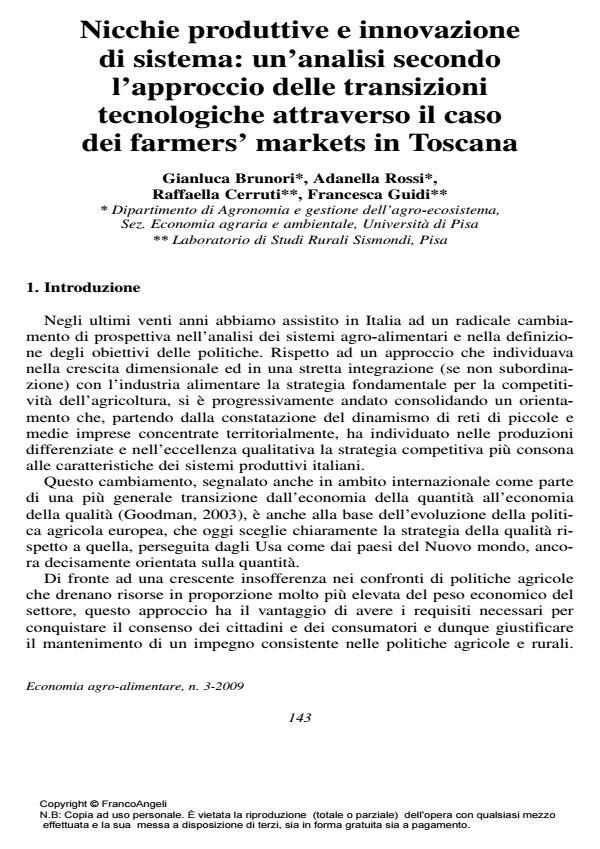Nicchie produttive e innovazione di sistema: un’analisi secondo l’approccio delle transizioni tecnologiche attraverso il caso dei farmers’ markets in Toscana
Journal title ECONOMIA AGRO-ALIMENTARE
Author/s Gianluca Brunori, Adanella Rossi, Raffaella Cerruti, Francesca Guidi
Publishing Year 2010 Issue 2009/3 Language Italian
Pages 28 P. 143-170 File size 369 KB
DOI 10.3280/ECAG2009-003008
DOI is like a bar code for intellectual property: to have more infomation
click here
Below, you can see the article first page
If you want to buy this article in PDF format, you can do it, following the instructions to buy download credits

FrancoAngeli is member of Publishers International Linking Association, Inc (PILA), a not-for-profit association which run the CrossRef service enabling links to and from online scholarly content.
The paper deals with the nature and the role of "niches", an issue that is crucial in the evolution from the economy of quantity to the economy of quality. For a long time this word has had a negative meaning in agricultural economics: the niche strategy was considered as a dead end, as symptomatic of weakness, an obstacle to the modernisation of the agri-food system. With the transition to the economy of quality this negative connotation has progressively eased and, instead, there is an increasing empirical evidence of the success of niche strategy for smallmedium scale food enterprises. However, the growth of the number of actors, of the variety of products and needs and of the opportunities offered by globalisation demands a further effort to adjust the conceptual models. In particular, there is a need for an analysis of niches as an important evolution context in the agri-food system and as possible area for innovation policies. Applied in the agri-food system, this approach allows to answer to the rising problem of the transition to more sustainable food systems. In other words, niches represent spaces of experimentation of new rules of consumption, production, research, social organisation, which can be successful the moment the external conditions change, or that can contribute to change the context through their growth. After some brief theoretical considerations, the paper analyses through this key to the reading the experience of farmers markets, and highlights potentials and limits for their growth. The key adopted allows to examine the distinctive features of this experience and to follow their evolution. For this purpose, it is useful the analysis of the network of actors involved, of the set of principles and rules adopted within it, of the set of material resources mobilised. Moreover, it allows to assess the role of farmers markets in fostering system innovation processes, by highlighting the dynamics that are developing within the niche and the strains that it put on the regime. The paper ends with some final remarks on the factors that can affect the expression of the innovative potential of these niches.
Keywords: Niches, radical innovation, farmers’ markets, sustainable agri-food networks, sustainable multifunctional agriculture
Jel codes: Q01, Q13
- Le filiere corte auto-organizzate dai consumatori: il modello dei Gruppi di Acquisto Solidale Emanuele Blasi, Clara Cicatiello, Silvio Franco, Barbara Pancino, in ECONOMIA AGRO-ALIMENTARE 2/2015 pp.33
DOI: 10.3280/ECAG2015-002003 - Advantages and Limits for Tourism Development in Rural Area (Case Study Ampoi and Mureş Valleys) Gavrilă-Paven Ionela, Bârsan Mircea Constantin, Lia-Dorica Dogaru, in Procedia Economics and Finance /2015 pp.1050
DOI: 10.1016/S2212-5671(15)01567-1
Gianluca Brunori, Adanella Rossi, Raffaella Cerruti, Francesca Guidi, Nicchie produttive e innovazione di sistema: un’analisi secondo l’approccio delle transizioni tecnologiche attraverso il caso dei farmers’ markets in Toscana in "ECONOMIA AGRO-ALIMENTARE" 3/2009, pp 143-170, DOI: 10.3280/ECAG2009-003008